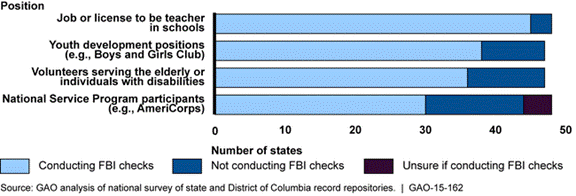Criminal History Records: Additional Actions Could Enhance the Completeness of Records Used For Employment-Related Background Checks

Most states that responded to GAO’s nationwide survey reported conducting Federal Bureau of Investigation (FBI) criminal history record checks for individuals working with vulnerable populations-such as children and the elderly-and other employment sectors that GAO reviewed (see fig. below). States that did not conduct FBI record checks said this was because the state lacked a designated agency to review check results, among other challenges. In 2006, the Attorney General proposed that nongovernmental entities also serve in this role but noted that this would require considerations about securing data and protecting personal information.
States Conducting FBI Criminal Record Checks for Selected Employment Sectors
Source: http://www.gao.gov/
![]()
Background Checks Proposed For Psychologists
Alaska psychologists could be required to undergo a background check under a proposed change to the licensing process. The Senate Labor and Commerce Committee moved a bill Tuesday that would allow the Board of Psychologist and Psychological Associate Examiners to require criminal background checks.The current licensing process includes a check on an applicant’s license in other states and self-disclosure of criminal history.
![]()
Criminal Background Checks Create Dilemma for Employers
Employers are struggling to deal with vague EEOC guidelines on how they should conduct criminal background checks. A recent federal appeals court decision slammed statistical evidence provided by the EEOC to prove discriminatory employment practices based on criminal background checks, but it fell short of addressing the agency’s aggressive stance pursuing perceived violations of Title VII of the Civil Rights Act of 1964. Employers are caught between staying in the EEOC’s good graces and risking a negligent hiring charge. Further complicating the issue is “ban the box” legislation, which forbids employers from asking job applicants about their criminal records. A related factor is the FCRA, which requires employers using third-party consumer reporting agencies to gather criminal background information to inform the applicant or employee that the information might be used in employment decisions. The FTC enforces that law, which gives applicants the right to dispute any findings.
Read more (Subscribers only)
![]()
Liars Index® Shows Almost One in Four Resumes Falsified Education – Lyin’ King Chosen
The Liars Index® reached its third highest rate since its inception in 1995, reaching 24.39% for the second half of 2014. “Nearly one in four resumes puffing their education claims is a rate too high to ignore”, said Jude Werra, CMC, president of the Wisconsin based executive search and selection firm, Jude M. Werra & Associates, LLC.

This year’s Lyin’ King (the most notable case in 2014) reported a career in the financial services industry, his resume asserting strong ethical principles and (ironically) a background in compliance. Unfortunately, his education claim did not hold up to scrutiny, calling into question the rest of his resume’s assertions.
Latest Data
©2015 Jude M. Werra & Associates LLC; Reprinted with permission.
Read more
![]()
Should Background Checks be Required for Emergency Volunteers?
When disaster strikes in Palm Beach County, Fla., a team of volunteers trained by county emergency managers can be deployed as the first line of defense, helping their communities with everything from search and rescue to basic first aid to putting out small fires. They can also be called upon to distribute or install smoke alarms, hand out disaster education materials or replace smoke alarm batteries in the homes of the elderly, according to a brochure about the program.
But there’s no requirement that they be subject to any kind of criminal background check.
That could change after a concerned Boynton Beach resident complained to the Florida Division of Emergency Management’s Inspector General.
Source: http://www.emergencymgmt.com/
![]()
The Magnificent Seven: The Coming Trends that Will Impact Background Screening
My magnificent seven trends are a mixture of good news and bad news for firms involved in conducting background checks. The good news is that a number of the trends track with the growth in the job market which will feed an increase in the demand for background screening services. The bad news is that the background screening industry is a mature industry and it is only a matter of time before emerging technologies will arrive that will cause catastrophic change in the industry. We are starting to get a glimpse into some of the potential technologies that could wreak havoc, however, if history bares any witness, it is most likely to be something that none of us saw coming.
How to Avoid Negligent Credentialing Liability
Since the seminal decision Darling v. Charleston Community Memorial Hospital (1965) was issued, approximately 40 states have adopted this liability standard. Sometimes referred to as “negligent hiring or selection” or “negligent retention,” this duty applies not only to hospitals but also to managed care entities, such as physician-hospital organizations and independent practice associations. Similarly, The Joint Commission, other hospital accrediting bodies, and state licensing boards impose clear and detailed obligations on hospitals and medical staffs to vet physicians’ qualifications at the time of appointment and reappointment and to continuously monitor their practices to ensure ongoing compliance with accepted standards of patient care services.
![]()
Employers Running Background Checks: Top 10 Tips to Avoid Joining the Fair Credit Reporting Act Litigation “Club”
What do Whole Foods, Chuck E. Cheese, Michael’s Stores, Dollar General, Panera, Publix, and K-Mart have in common? Each of these companies has faced lawsuits (including class actions) under the Fair Credit Reporting Act (“FCRA”). Although Congress passed the FCRA way back in 1970 and litigation has focused on credit reporting agencies’ duties under the law, class action plaintiff firms have recently focused on the FCRA’s employer-related provisions. Several large settlements (such as Publix’s $6.8 million class action settlement, Dollar General’s $4 million, and K-Mart’s $ 3 million) have spurred further litigation. While some of the alleged FCRA violations may appear minor or technical in nature, these “technical violations” still result in costly lawsuits. Employers should re-familiarize themselves with the FCRA to avoid becoming class action defendants.
![]()

